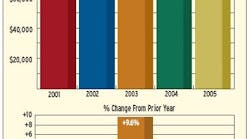After a modest downturn last year, the reported average salary this year is $72,906, up 2.5% from last year, and slightly above the survey’s highest level of $72,441 from 2003.
A Fitful Future
“I am close to retirement, so hopefully I’m safe,” was the hope of a mechanical engineer in his early 60s who works for an air and gas compressor manufacturing company in North Carolina. “One of my sons already dropped out of engineering for a more secure job in sales forecast analysis,” he said. “My other son is an engineer and has been downsized by three major companies so far and is on notice that his current company also is considering downsizing.”
Although the economic recovery has been slower than expected (see National Association of Manufacturers Survey), results of a recent survey by the National Association of Manufacturers shows that the vast majority of manufacturing executives (92%) still remain optimistic about the growth of their own businesses. In addition, nearly half polled plan to increase their headcounts over the next six months, and 90% report being on pace to meet or exceed their sales targets.
There’s some evidence of this in the survey. “We were laying off 12 months ago, but started hiring again this past February,” said Eric Lund, a mechanical engineer at Michigan-based Burr Oak Tool and Gauge.Guilty of Profiling
As our typical machine control professional, you are, based on our data, a Caucasian male between the ages of 46 and 55. You live in the U.S. (at least for now) and work in a large state like California or Texas, or Pennsylvania, Ohio, Michigan or Illinois. You’re married; you have kids; and you earned as Bachelor’s degree in electrical or mechanical engineering.
You’ve been working in engineering and machine design a while now--many of you well into your second decade. You put in a full 40-hours of work each week, often times more, mostly performing engineering and system integration services. You’ve been with several companies during your career--as many as three or four – but you’ve been at your current job for about ten years.
“I like where I am right now,” said one respondent who has many years in the industry. “My only compensation is salary, but it is a good salary. I entered control system design from the process control side, not the electrical side. I figure someone has to know how the processes work.”Longer in the Tooth
For the first time in this survey’s five year history, the average age of the respondent climbed into the 46-55 year-old bracket (31.9%). In fact, there now are more of you in the 55-and-older group (19%) than in the 26-35 year-old group (15.6%). Does this speak to a growing infusion of fresh, new engineers. Probably not. It’s more likely that the pool at top of age scale is disappearing, simply making the other age groups represent a bigger percentage of a diminishing total. Gender is still overwhelmingly male at 95%, and 92% of the males surveyed are Caucasian, followed by Hispanic (3.5%), Asian (2.7%) and African American (0.7%).
Electrical engineering led the way (35.4%) as the degree most of you pursued, followed by mechanical engineering (just over 20%). Only 5.3% come from an industrial engineering background, and just 3.2% from math or physics. The rest, and there are a lot of you (32.3%), consist of degrees in chemical engineering, industrial/mechanical design, computer science, or business. Some even come from backgrounds in geology, animal science and journalism. Dad must’ve known somebody at the plant.
While only one in 10 of you carry a P.E., most everyone (nearly 80%) belongs to at least one professional engineering society, with ISA, ASME and IEEE leading the way.And Now for Some Bad News
We know surveys can be highly subjective, but when asked a series of questions to gauge overall job satisfaction, a majority responded that they were mostly satisfied in their positions (64.2%). Others sought more challenging work, or didn’t feel appreciated enough.
Job Satisfaction/Angst
Almost half of all respondents said challenging work is what gives them the most job satisfaction, followed by being appreciated for a job well-done (17.1%). Salaries and benefits was of primary importance to just 16.2%, indicating most are comfortable with those aspects of their jobs. Opportunity for advancement polled low, at 8.2% and job security as a primary influence on job satisfaction only registered with 11.6%.
Overall, more than 93% of respondents are very, fairly or somewhat satisfied with their jobs. But when it comes to job security, this is a fairly close one: 52% of you aren’t concerned with job security and 48% of you are.
So, if this year’s survey provides an accurate reading of our industry’s state-of-mind, then all indications are that the patient is in a bit of a funk. You basically are satisfied with your job. You just hope it doesn’t get outsourced!Job Outsourcing
Companies in our survey are hiring again (46%) and offering raises, promotions or overtime (a combined 54%), but outsourcing is hanging over employees’ heads like a dark, ominous cloud. The trend that has become business as usual has them questioning the direction of the entire manufacturing industry and their own mortality in it. Half the companies out there already are outsourcing, and there are indications from those surveyed that the movement continues.
“I consider outsourcing of engineering to be a serious issue,” noted an applications and test engineer currently in the $90K range. “I believe that in the long run, it will cause the industry serious damage.” The reason: “We haven’t hired any entry level engineers to learn the product and system,” he adds. “When those of us with the experience leave, trying to function with engineers in India will be a serious problem.”
There are at least a few companies that want to keep the talent here. “Some in our company finally are figuring out that having experience and intelligence inside the plant, as opposed to outsourcing most of the engineering, pays dividends in the form of faster response to problems, machine modifications, and building machines that do more than just meet spec,” explained Ralph Kitts, an electrical engineer working for North Carolina-based Day International.
There’s too much outsourcing, said one respondent. “It seems management has lost sight of the corporate mission, unless the mission is to just make money.”Experience on the Decline?
According to a recently published article, "Industries Brace for Skilled-Labor Shortage," manufacturers are on the verge of an acute skilled labor shortage brought on by the looming retirement of the baby boomers. The unfolding demographic trends have industry groups fretting about whether they’ll be able to find enough young employees to replace aging or retiring engineers. This seems to apply to controls professionals as well.
Our survey shows that the majority of you have at least 15 years in machine control and automation, and more of you 22%) have 21-29 years in the industry. But, as noted earlier, there is a growing concerned with the perceived lack of interest in engineering by the next generation.
Many who answered the survey griped about the lack of qualified personnel and “old school” machinists working in the industry today. Too many button pushers, they said.
“I believe engineers are being treated more and more as a commodity that can be had right out of school,” said Stephen Ciricillo, an electrical engineer on the East Coast designing precision controls for engines and turbines. “I think the experience level of mature engineers is holding far less sway than it once did, and the notion that anyone with a degree can design a product seems to be gaining acceptance in management ranks.”
He still thinks it's a great field to be in because of his involvement in what he described as the growing market of embedded systems development. And to newcomers he advises, “Don't ever stop learning. Don't ever stop reading trade articles. Don't be afraid of anything new. Explore new technology on its own merits. Failure to grow and change is a prescription for mediocrity.”
One respondent, B. Rickdeschel, an electrical engineer for P/A Industries in Connecticut, suggested that part of the problem is that new employers keep trying to re-invent the wheel. He offers that it’s better to ask advice from experienced people than dive in and tackle projects without guidance. “Try to follow established guidelines,” he recommended. “There are two ways to learn in this business: either review past relevant designs while asking a lot of questions, or do it the hard way!”
The owner of a Michigan-based metalworking machinery manufacturing business claims that his company is very generous to its employees and takes care of its most valuable engineers. “We constantly re-invest profits into the company to drive growth, and our employee turnover is extremely low,” he boasted. “A lot of companies would pay lots of money to learn how we run our business. Those who know how to improve production and competitiveness for manufacturers are the ones who can save the manufacturing base in the U.S.”
In the opinion of one senior manufacturing engineer based in Michigan, the large corporations are faltering by not taking advantage of their real strengths. “They continually trod on the experienced and cater to the young and inexperienced,” he said.
David Walton, an Ohio-based project engineer, says there are too many MBAs running the engineering and manufacturing companies today. “Higher-level management has lost the engineering and technical experience that was present when I started in the late 1970s,” he said. “So get as much experience as possible on the manufacturing floor in as many different industries as you can.” It’s hard to argue that manufacturing floor experience isn’t critical in the development of an automation career.
“Set your expectations such that rapid change is the norm,” advised one respondent assessing the current landscape. “Job security lies in having skills that allow you to rapidly find new employment situations.” But without a good set of skills, “Learn to speak Chinese.”
Advice to Those Entering the Profession,
From Those in the Profession
- “There’s no advancement unless someone dies or gets fired.”
- “Pick a segment of the industry that will not be outsourced.”
- “Learn software... backwards and forwards. The future is in PC control.”
- “There will always be a need for this type of work.”
- “Learn to speak Chinese.”
| METHODOLOGY Earlier This year, we e-mailed invitations to our subscribers and included a link to the survey in several of our e-newsletters. Five-hundred and sixty-one usable surveys were returned. Responses from the 39 questions we posed were analyzed and all results are posted on ControlDesign.com. |




